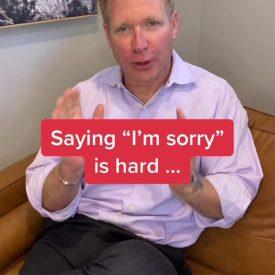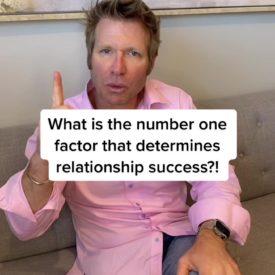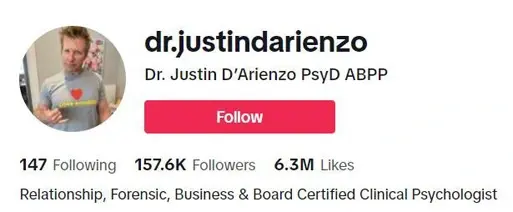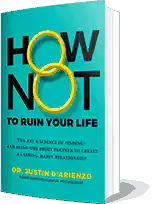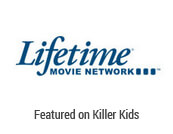- HOME
- PSYCH SERVICES
- BUSINESS & PERFORMANCE PSYCHOLOGY
- CLINICAL, COUPLES, & FAMILIES
- ADHD Treatment & Evaluation Services
- Anger Management
- Anxiety Treatment & Evaluation Services
- Borderline Personality Treatment Services
- Cognitive Behavioral Therapy (CBT) Self-Help
- Couples Counseling and Marital Therapy
- Consent for Psychological Services for Minors Post-Divorce
- Depression Treatment Services
- Infidelity Recovery
- Jacksonville Counseling and Psychology
- Military Psychology & Tricare
- Narcissistic Personality Treatment Services
- Online Counseling
- Psychoeducational Testing
- Psychological Testing and Assessment
- Psychotherapy & Counseling
- FORENSIC PSYCHOLOGY & EXPERT TESTIMONY
- LIFE COACHING & EXECUTIVE COACHING
- PSYCHOLOGICAL PUBLIC DISABILITY QUESTIONNAIRES (DBQ)
- ONLINE COURSES
- Our Partnership Begins When You Purchase an Online Course
- Get to Know Dr. D’Arienzo, Relationship Expert
- Florida Premarital Preparation Online Course
- Georgia Premarital Education Online Course
- TwogetherinTexas Premarital Online Course
- Tennessee Premarital Preparation Online Course
- Minnesota Premarital Education Course Online
- Oklahoma Premarital Counseling Online Course
- South Carolina Premarital Preparation Course
- West Virginia Premarital Education Course
- Online Marriage and Relationship Tune Up Course
- Florida DCF Certified Parent Education and Family Stabilization Online Course
- Georgia Qualified Parent Education and Family Stabilization Online Course
- Texas Qualified Parent Education and Family Stabilization Online Course
- High Conflict Co-Parenting Online Certificate Course (8 Hours)
- Online Anger Management Four Hour Course (Level 1)
- Online Anger Management Eight Hour Course (Level 2)
- Sexual Harassment Online Training
- MMPI/GUARD/LEO
- CPI Police and Public Safety Assessment
- G License Psychological Testing
- Online Psychological Testing for Armed Security Guards and Personal Protection Officers
- MMPI Texas Level III CSO and IV PPO Psychological (ONLINE)
- Requirement for Texas Security License Applicants: MMPI Evaluation
- Level 3 Security Guard New Mexico Online MMPI Psychological Evaluation
- TEAM
- SOCIAL MEDIA/BOOKS
- APPT REQUEST
Florida Premarital Preparation Online Video Course
Developed by Board Certified Psychologist and Relationship Expert
Our Course is LGBTQ+ Affirmative!
Make Money by Taking Our Course
Cost of Florida Marriage License
$93.50Cost of Our Online Florida Premarital Course
$14.97Florida Marriage License Savings by Completing Our Course
$25.00
Taking our Course Also Eliminates the 3 Day Wait Requirement
Florida Premarital Preparation Video Course Test Drive
Introduction: Welcome to the Official Florida Premarital Preparation Online Course. Our program is completely online and now in video. The course has six main sections and, in each section, you may either view the optional video (not included in sample) or read the corresponding material. Once you have viewed the optional video and/or read the material, each section has an exercise that needs to be completed.

Prior to getting started, I would like to share a bit about myself, your course leader. My name is Dr. Justin D'Arienzo, and I am a Licensed Clinical Psychologist, Certified Florida Supreme Court Family Mediator, Parenting Coordinator, Custody Evaluator, and Relationship Expert. I am also known as the Relationship Doctor of Jacksonville, Florida. Much of my clinical work is conducted providing premarital therapy, marital therapy, and family therapy, while much of my forensic work is addressing some of the darker issues at the back end of a relationship like divorce therapy, high conflict co-parenting therapy, and custody evaluations for the children. As you can imagine, I deal with the great joys of early relationships, struggles in the middle, and the destruction that occurs through the divorce process because of infidelity, addiction, neglect, and abuse. Treating all types of relationships gives me a keen understanding of what is a healthy relationship from the beginning and what types of relationships survive the test of time.
Additionally, I offer a series of online premarital courses for several states, including Florida, Georgia, Tennessee, Texas, and Oklahoma. In those courses, and in face to face premarital and marital therapy, I teach much of the material that will be in this online workbook. I have found that if the material is applied, couples grow closer, improve communication, and discover new things about themselves and each other.
Marriage is a challenge and couples need to ensure they have the adequate skills to make it work successfully. Marriage takes two individuals willing to give each other (and their children) 100 percent, even during challenging times. It takes commitment, trust, and hard work.
This online workbook can be done alone to learn more about yourself and your relationship needs, or it can be actively completed jointly as a couple, and you both can work the exercises together. Completing this online course book together would be an act of love and should be viewed this way based on the time commitment it will take to finish it. Again, if you are taking it alone, use it as a tool to reflect on past relationships and to ensure you have a healthy vision for a future relationship. Let's get started after we review the course outline.
The course is broken into six sections below. Click on each section to see that section:
- The Structure of a Healthy Relationship (Deepening Friendship, Love, and Intimacy)
- Understanding Psychological and Emotional Needs
- How Do Our Personalities Fit?
- Financial Literacy
- Communication and Conflict Resolution
- Complete Quiz and Questionnaire to Receive Certificate
Section 1 - Structure of a Healthy Relationship
What is a Healthy Relationship?
"The Sound Relationship House" – Developed by John Gottman and Julie Schwartz Gottman
Having a sound relationship house is the goal. You may be asking yourself, "What is a relationship house?" A sound relationship house is not by definition a perfect house, but rather a house that is functional. It has good days and it has bad days, but overall the house functions, is safe, and is a place where a family or couple can thrive. There are four components of the Sound Relationship House. These components include:
- Friendship
- Positive Perspective
- Managing Conflict
- Supporting Joint and Individual Hopes, Dreams, and Meaning

Friendship
Friendship is based on how well we know our partner. The Gottman's defined the term for how well we know our partner as a love map. Each of us has a love map. Truly knowing our partner is knowing their love map. Knowing our partner equates to understanding their likes and dislikes, knowing about their history and goals (including past traumas), and being knowledgeable about how they will act in given situations. It is also about knowing their interests and enjoyments, such as their favorite types of movies, favorite foods, and their hobbies. In addition to knowledge that comes with knowing someone in an intimate relationship, there are many other tools that help us gain an understanding of our partner – tools such as personality tests, such as the Myers-Briggs, which tell us a lot about how our partners perceive and understand the world. How can you work to build your love map with your partner? Understanding and knowing your partner as described above is a big step in building your love map. Ask yourself, do you admire your partner and express fondness toward them? Do you turn toward your partner?
For example, do you spend time together, do you express an interest in your partner's perspective, do you share values, do you listen, is he or she your best friend? Getting to the point where you answer yes to all of these questions is a great way to build a strong love map.

A Positive Lens
Just like we know that a positive attitude can improve one's reactions to life in general, research has found that those with a "positive lens", or positive perspective, toward their partner created a substantial positive difference in their relationship toward the positive compared to those with a negative lens or negative perspective. With a steady positive attitude, partners typically give their partner the benefit of the doubt when their spouse or partner makes a mistake. And when their partner does something pleasing, the partner on the receiving end sees this behavior as confirmation that their partner is a great person. On the other hand, couples who regularly experienced hurt, misunderstanding, anger, disappointment, unjust accusations, frustration and personal attacks develop a negative lens. This results in thoughts of leaving, getting even, or protecting themselves. Developing a negative lens leads to a downhill slide in a relationship. With a negative lens, once one's partner acts unjustly or inappropriate, one views this as confirmation that their partner is not trustworthy or not right for them.

Managing Conflict
Couples that are able to understand and manage their emotions and behaviors, as well as understand how their partners respond to conflict, are significantly better equipped to have functional relationships. This is related to what is known as Emotional Intelligence. The Gottman's have found that couples that are able to manage conflict do well, whereas those that don't manage conflict well often divorce. The Gottman's uncovered four behaviors that are exhibited during conflict that either sustain conflict or lead to even greater conflict. I will discuss each of these behaviors, labeled the Four Horsemen, and also provide antidotes for each, below.
Criticism
The first of the four Horseman. According to John Gottman, most relationships have an element of "criticism", but it is imperative that couples work on reducing the level of criticism that they give to their partner. Further, when a relationship become negative or highly conflicted, most feedback is perceived as negative. In fact, even constructive criticism is considered negative. Research shows that for everyone criticism given, five positive statements are needed to counteract the negative effect of this one statement. This makes it difficult when a relationship is already negative, as it becomes extremely difficult to have positive interactions. The goal is not to be critical, which will help prevent a downward spiral.
Defensiveness
The second of the four horsemen and a major offender in relationships. It is one of the most frequent behaviors that I observe in couples therapy when there is conflict. Defensiveness is often a reflex action to criticism or to perceived criticism. Sometimes there is no criticism but just feedback stated. However, the individual on the receiving end responds by blaming the other for doing the same thing, denies their responsibility in the matter or whines and makes an excuse for their behavior. When the original speaker experiences the defensiveness of the receiver, they often feel invalidated and alone and the couple becomes more distant. Antidotes to defensiveness are the following: (1) Remind yourself that a relationship is about being part of a team (not two individuals working against each other). (2) Rather than seeing your partner's words as an attack, see them as strong expressions of feelings about the topic being discussed. (3) Acknowledge that you are not perfect. (4) Remind yourself of the positive qualities of your partner. (5) Most importantly, take some responsibility for the feedback your partner is expressing. Don't apologize for something you have not done. Accepting even 10 percent of responsibility, if it is due, will de-escalate tension, improve communication, and build trust.
Stonewalling
The third of the four horsemen. Stonewalling is just as it sounds. It is an avoidance or refusal to address or communicate about an issue or conflict. To the other partner, stonewalling often feels as though they are "talking to a brick wall". In his research, Dr. Gottman found that 85 percent of men used stonewalling as a way of dealing with conflict, yet they did not realize that this was a very destructive strategy. Men often use a distancing technique to cope with high levels of emotion. Remember that withdrawing from an argument does not solve it and "parallel living" has been found to be a consequence of this behavior over the longer term. Parallel living leads to a pulling away from a relationship, leaving it vulnerable to outside forces. Also stonewalling leads to increased conflict and major melt downs when the non-stonewaller begins to chase the stonewaller about an issue. At some point the stonewaller reacts with rage, often leading the couple to a regrettable incident. Antidotes to Stonewalling are as follows: Resist the temptation to withdraw –stay with your partner emotionally. Look for the good in each other. Make time for positive experiences. Don't ignore your partner and give some sort of response even if it is just a nod or a brief reply. Further, it is important to practice good self-care to avoid stonewalling. We often stonewall because we are anxious about conflict. Conflict causes many of us anxiety. Again, in order to better manage the anxiety of dealing with difficult issues, it is important to practice good self-care like getting a good night sleep, exercising frequently, and maintaining a healthy diet. Avoidance is okay in a relationship as long as you are avoiding stonewalling.
Contempt
The fourth of the four horsemen (belligerence is a term used by Gottman to describe a stronger form of contempt. Belligerence is also known as the cousin of the four horsemen). Gottman believed that "contempt" was the most dangerous of the horsemen and he found that "contempt in a relationship" was predictive of divorce in 86 percent of cases. "Contempt" can be described as any behavior which causes your partner to feel "put down". Examples include belittling your partner, treating them with disdain, eye rolling, sneering, insults, name calling, mocking and cynicism. Contempt can be as simple as having disdain or disgust with your partner in how they chew gum, eat, drive, or snore at night. Warning signs of "contempt" include: You no longer feel admiration for your partner. It is difficult for you to remember your partner's positive aspects. You feel that your partner has severe personality deficiencies. Antidotes for contempt include: Focus on your partner's positive qualities. Use "time-out" when you recognize that the situation is becoming heated. Watch your tone and facial expressions. Focus on the behavior and not the person. Most importantly, gain an appreciation of where your partner is coming from. Often when we are able to put our partner's behavior in context, we have a greater appreciation of the cause or causes of their behavior and as a result, better see that their behavior is about them rather than about us.

Additional Tools to Resolve Conflict
Joint Influence:It is imperative that both partners accept the "influence" of others. Typically, in relationships there is a top and a bottom, and the top has ultimate veto power. Relationships are most effective when each party has equal veto power with most issues. Further, Dr. Gottman found that in the happiest of marriages, men accepted the "influence" of their partners. Examples of "influence" include: a belief that you can learn from your partner, not rejecting their opinions and believing that they can also come up with good solutions.
Solve Arguments Before They Are Over
Partners that make effective repairs have functional and successful relationships. This means that functional parties resolve problems or arguments during the argument. When couples resolve each argument, problems are resolved at that time and do not become additive and resurface during a future argument. Further, having a partner who has the ability to say they are sorry is crucial. Being able to say you are wrong takes courage and trust and is helpful in reducing conflict and having a loving relationship.
Humor and Affection
Creating an atmosphere where one can break the negativity is helpful. One can use humor or offer their partner a cup of coffee or tea after the argument, ask their partner for a hug or make light of the argument without invalidating the other. Make-up intimacy also helps make peace and reconnects the partners. Moreover, having a sense that your partner will accept your efforts to improve the situation and vice versa is paramount.
Compromise
Making compromises is key in building trust and commitment and ensuring safety. Having a sense that your partner will give way on things if there is a disagreement ensures safety. "Black and white thinking" – such as "I'm right so you must be wrong" – is dangerous. Couples must be able to give and take in an argument and share power.
Fight with the End in Mind
Also, couples need to fight with the end in mind. So, what should the end in mind consist of? The end in mind should focus on resolving the issue and simultaneously ensuring your partner feels good during and after the conflict. Both partners must control their stubbornness. Couples should practice calming techniques, meaning they should pay attention to their heart rates. When we have a heart rate above 90 to 95 beats per minute, we are emotionally flooded and have difficulty being rational in arguments and are in a state of fight, flight, or freeze. When we are flooded, we should pause or take a time-out for 20 to 30 minutes from an argument and then resume discussion in order to resolve the conflict. Just as we should not spank our children when we are angry or emotional, we should not argue or discuss important matters with our partner when we are angry, or we will inevitably say or do something that we regret. Most importantly, if you need a break from an argument, take a break, but resolve the issue immediately following your break.
Avoid Fight or Flight
Watch for signs of flooding – like feeling overwhelmed, not being able to stay calm during arguments, wanting distance, and small issues becoming big ones. If you are flooded, take a break.

Markman and Stanley Technique
Finally, I have illustrated Safe Talking Techniques that have been adapted from Markman and Stanley in "Fighting for your Marriage." These techniques enable each partner to speak without interruption.
- Use of a jointly valued item such as a talking tool (for example, a wedding ring or a photo of the family or the couple).
- Each person takes turns to hold the item and the person who holds it also holds the floor.
- The person listening then repeats back what they have heard and checks that it is correct.
- The other person then takes hold of the talking item and speaks while their partner summaries.
Gottman Five Step Method
Dr. Gottman has developed a five-step tool to discuss an issue or major problem that needs to be resolved. Remember the goal is to gain a greater understanding of where your partner is coming from rather than to win the argument. When I work with couples, I want them both to feel like they have been heard, understood, and are accepted for their position. Often achieving the above deescalates the situation and the couple finds resolution. Couples that get along and don't have conflict easily agree to disagree. Couples who have high conflict are threatened by disagreement.
In using the five steps below, couples should work through each step together.
- Feelings: Share how you felt about the situation. Do not say why you felt that way. Avoid commenting on your partner's feelings. Stay in your lane.
- Realities: Describe your "reality." Take turns. Summarize and validate at least a part of your partner's reality. Remember, their reality should not be a threat to you. During conflict we have selective attention and therefore partners remember the same situation differently.
- Triggers: Share what experiences or memories you have had that might have escalated the interaction, and the stories of why these are triggers for each of you. Own your own trigger. Don't blame, criticize, or minimize your partner's triggers.
- Responsibility: Acknowledge your own role in contributing to the fight or incident. This is the opposite of defensiveness. When we take a little responsibility, this is deescalating for our partner.
- Constructive Plans: Plan together one way that each of you can make it better next time. Now that you both have a better appreciation of where your partner is coming from, you have been heard, and you each have taken some of the responsibility for the regrettable incident, you are better able to find a resolution with your partner.
Supporting Joint and Individual Hopes, Dreams, and Meaning
Supporting each other's hopes and dreams and having a shared understanding of the meaning brings us to the last section of the Sound Relationship House. If we are able to achieve friendship, see our partner through a positive lens, and resolve conflict, then we are ready for this last component. This component involves having shared rituals, goals, roles and symbols with each other.
Rituals: Finding shared rituals is important. Rituals bring us together, give us security, and provide us with an activity that we look forward to. Ask yourself what type of rituals you would consider creating with your partner. What are the rituals that you engage in within your family? Do you eat dinner together, are there special celebrations that you all value, do you share values regarding television, education, time spent together?
Goals: Just as it is important to have developed rituals, successful couples have shared goals and visions for their lives and the relationship. An effective relationship is one that supports each person achieving their own personal goals as well as the goals of their partner. Ask yourself and your partner, do you honor each other's goals, do you have similar financial goals, do you have compatible life dreams, do you each value the accomplishments of the other, and do your life paths fit well together?
Roles: In an effective and functional relationship, each person has an agreed upon role or roles that are supported by the other. Ask yourself, do you support each other in your role in the family, does one of you have an expectation that you hold a particular role that is not shared by the other? How does this impact your relationship?
Symbols: In a functional partnership, individuals understand their partner's meaning behind symbols and factors related to daily living. It is not necessary to have the same understanding or meaning with symbols, but it is paramount that we appreciate what the following mean to our partner. It is also important not to just appreciate but to honor our partner's meaning and reality of these symbols. Some key symbols include:
- The home
- Money
- The meaning of family
- The role of sex
- Fun and play
- Trust
- Personal freedom
- Autonomy
- Sharing power
- Adventure

EXERCISE 1
Spend 30 minutes as a couple and complete the following exercises.
- Share something with your partner that they don't know about you.
- Each of you share something that you admire or find amazing about the other.
- Commit to each other that for today you will practice moving toward each other and be open to the other's expressions of affection and desire to communicate.
- Explore together how the balance of power may be improved in the relationship. Do you both share equal power related to spending, children, future plans, and domestic responsibilities?
- Use one of the techniques above to discuss an issue that has created conflict (Gottman or Markman and Stanley).
- Together discuss a personal goal that you would like the other to help you accomplish, create a new ritual that will define you as a couple, and discuss personal values that you each have that you would like to follow as a couple.

Free Bonus - Dr. D'Arienzo's ebook
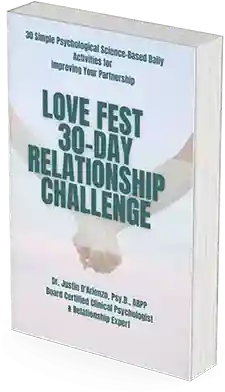
Get Dr. D'Arienzo's Love Fest 30-Day Relationship Challenge: 30 Simple Psychological Science Based Activities for Improving Your Partnership. This e-book is valued at $4.99 and is included FREE with your course purchase. As seen on Amazon, this e-book welcomes you to Dr. D'Arienzo's Love Fest 30-Day Relationship Challenge! Get ready to embark on a transformative journey that will strengthen your bond and bring you closer as a couple.
From the author of:
Over the next 30 days, he will provide you with daily activities rooted in psychological science to improve your relationship. By participating in this challenge and being bold in your commitment, you will witness positive changes and experience the joy of deepening your connection. Each day, a new activity will be presented. Get ready to take your relationship to new heights and create lasting memories together. Let the Love Fest begin!
Dr. Justin D'Arienzo, Psy.D., ABPP, Board Certified Clinical Psychologist

This course was developed by Dr. D'Arienzo, a clinical and forensic psychologist, couples therapist and relationship expert. We use the same scientifically based practices in the course that we use everyday in our offices to help people develop better marriages.
Testimonials
 Clint
Clint"Thanks Dr. D'Arienzo. I did not know that I have both passive and aggressive tendencies. I'm fixing both because of this course. My wife said she can see a difference of taking this course."
 Amanda
Amanda"Great course!. I learned that anger was learned through my childhood and watching others, and not being able to separate the emotions that triggers anger. Now I have the answers to change my life"
 George
George"Easy to understand, got my certificate quickly for my court case. Judge approved of it."
 Christie M.
Christie M."Thank goodness a premarital course like this is offered. The exercises were practical. I used the friendship ones with my best friend too."
Google Reviews
Premarital Course Reviews
Submit your review | |
Florida Premarital Preparation Online Course Instructions
Average rating: 39 reviews
Nancy Toomer
Feb 18, 2025
Great and easy
We really enjoyed the course because the videos and content are well-structured, concise, and easy to understand, making the learning process both efficient and enjoyable.
Alan and Ivu
Jan 6, 2025
The Course was enlightening
The best four hours we have spent in a very long time. Learning how to deal with conflict. Thank you, A and I
Darla Strong and John Erickson
Oct 16, 2024
Great premarital course!
Great premarital course! We learned how to effectively communicate and manage conflict. Also how to use a budget to manage our money and debt. Highly recommend!!!
Devyn johnson
Jun 4, 2024
Great
Thank you so much
Emma & Cole
Jun 4, 2024
Great Course
This course was straight forward and approachable. Everything we needed and were looking for.
James Fabiano
Apr 22, 2024
Great Course
Both my partner.
Melanie
Mar 18, 2024
Best Advice!
We enjoyed the lessons this course provided as well as the worksheets. I appreciate that it is a at your own pace course that was you can split it up.
The Future Mr. and Mrs. Dikijian
Mar 11, 2024
Florida Premarital Course
I highly recommend this premarital course as it offers an excellent communication style, thorough financial budgeting guidance, effective conflict resolution strategies, and valuable insights on fostering a healthy, loving relationship. The course exceeded our expectations and provided us with the necessary tools to build a strong foundation for our marriage. I am grateful for the knowledge and skills we gained, and we believe it will significantly contribute to our future success together.
Thanks for the great feedback about our premarital course! Best of Luck to The Future Mr. and Mrs. Dikijian!!! Best, Dr. D
Chriristina
Dec 15, 2023
Recommended
I recommend all couples to take this class before they get married.
Christina! Thanks for the great review of our Florida premarital course! Best, Dr. D
Lauren
Oct 11, 2023
Online course
Overall I think it was a great class to take. Definitely recommend
Thanks for the great review on our premarital course Lauren! Best, Dr. D.
Page 1 of 4:
«
‹
1
2
3
4
›
»
Articles About Taking the Course
Florida Premarital Preparation Online Video Course: Saving You Money and Teaching You About Love!
Our Florida Premarital Course is both LGBT and Straight Friendly
The Florida Marriage License Cost is $93.50. By taking the DPG Premarital Online Course you save $25.00 on your marriage license cost, reducing your Marriage License fee to $61.00 and you avoid the three day Florida state wait requirement. The cost of our online premarital course is $19.99 (per couple) giving you an actual savings of $12.51 off your Florida Marriage License. It is better than free, and we know that you will love it! Click on "How Our Course Works" below to begin:

What Does the State Statute Say about the Requirements for the Florida Premarital Course?
Florida Premarital Preparation Course Statute
After the wedding is over, the marriage begins and keeping it going can be hard work. Florida recognizes the challenges that married couples face and want to support the success of these relationships. For this reason, the Florida Premarital Preparation Course Statute was created and couples who complete this special course not only have a better foundation for their marriage but also receive a reduction in the marriage fee by $25.00.
Course Topics
The goal of the course is to provide couples with the tools needed for a successful partnership and marriage and primary topics include:
- Conflict management.
- Communication skills.
- Financial responsibilities.
- Children and parenting responsibilities.
- Review of information about the challenges faced by married couples who have sought marital or individual counseling.
You must take a course with a minimum of four hours of instruction to qualify for the benefits under this statute.
Course Options
Recognizing that adults have demanding schedules and so there are many options available to take and complete this course. These options include:
- Direct personal instruction;
- Videotape instruction;
- Instruction via other electronic medium; or
- A combination of these methods.
Couples can also choose to take these courses together or individually, as best meets their needs. Each person must complete the course and receive a certificate of completion from the instructor.
Instructor Options
There are several qualified instructors who can provide this course, but they must be registered with a judicial circuit (county courthouse) for their program to qualify under this statute. Instructors can included:
- Licensed Psychologists
- Licensed Clinical Social Worker
- Licensed Marriage and Family Therapist
- Licensed Mental Health Counselor
- Trained Representatives of Religious Institutions
- Other Providers Designated by a Judicial Circuit, such as a school counselor.
Finding an Instructor
Every judicial circuit maintains a roster of qualified instructors. This information includes:
- Type of course, such as video, in person, etc.
- Cost of the course.
- Whether the provider offers the course for free or on a sliding scale.
Course Completion
When a couple has completed the course, each one will receive a certificate of completion that states:
- Their Name
- Date of Completion
- Course Structure, i.e. video, electronic, in person or combination.
When both parties have completed the course, they qualify for the $25.00 reduction in the state marriage fee.
Payment and Course Instructions
Dr. D'Arienzo's Premarital Course Registration
Dr. D'Arienzo is proud to be a registered instructor for all 67 Florida counties, providing an online course that is both LGBT and straight friendly. As a specialist in relationship, marriage and divorce counseling services, Dr. D'Arienzo created this online course based on his 20+ years of experience to help prepare couples for the life-long journey of marriage.
To register and pay for the course you may:
- Click on the red purchase button to use a credit card or Paypal; or
- Contact our office at (904)379-8094 during business hours.
Please note that this payment is non-refundable but only one registration is required for per couple.
Accessing and Completing the Course
After receipt of your payment, we will send you an email that includes the password you need to access the course. Once you have the password, simply go to Dr. D'Arienzo's Premarital Course Login, enter the password and begin. If you have any difficulty finding your password or accessing the course, please call our office during normal business hours.
Once you have logged in you:
- Have 90 days to complete the course.
- Must read the materials and complete the exercises.
- Complete theshort questionnaire at the end. Be sure to take your time and be as accurate as possible when providing your names and emails.
The course should take at least four hours if completed as instructed, which meets the requirements under Florida law that you must spend a minimum of four hours on a Florida premarital course to receive your certificate of completion.
Certificate of Completion
Once you have submitted the questionnaire, a PDF copy of your certificate of completion will be immediately sent to you by email. The majority of counties will accept this PDF certificate as proof of your completion of the course and only a few require an original certificate of completion. If your county requires an original certificate, we must mail the certificate to you, which you should receive within two to three business days of completion of the course. Counties which require an original certificate of completion are: Alachua, Bradford, Desoto, Dixie, Flagler, Gulf, Hernando, Highlands, Leon, Levy, Monroe, Nassau, Okaloosa, Okeechobee, Pasco, Polk, Putnam, Seminole, and Taylor Counties.
If you have any questions about this course, please check our FAQ page which has additional information.
What are the Benefits of Our Course in Addition to Saving You Money?
- Learn how to be more intimate and potentially improve your sex life.
- Decrease your chance of divorce and conflict.
- Learn how to improve your compatibility and communication together.
- Learn how to resolve arguments, conflicts, and disagreements.
- Learn about your future spouse's dreams, desires, and goals.
- Learn more about your personality and your future spouse's personality.
- Learn how to resolve financial matters and learn how to better budget.
- Learn even more about yourself and your future spouse and about marriage!
Florida Premarital Preparation and Relationship Advice
19 Florida Counties that Require an Original Premarital Preparation Course Certificate
Here is a short video listing the counties whose court house requires an original and inked course certificate versus th...
View moreEffective Methods of Communication for Couples
Effective Methods of Communication for Couples Updated 2023--Effective Methods of Communication for Couples was written...
View moreFlorida Premarital Course
Where Duval County goes to take the Official Certified Florida Premarital Preparation Course Our Certified Florida Prem...
View moreAuthorized in All 67 Florida Counties
Find information about where to get a marriage license and research venues in your county
- Alachua
- Columbia
- Hamilton
- Lake
- Nassau
- Sarasota
- Baker
- Desoto
- Hardee
- Lee
- Okaloosa
- Seminole
- Bay
- Dixie
- Hendry
- Leon
- Okeechobee
- St. Johns
- Bradford
- Duval
- Hernando
- Levy
- Orange
- St. Lucie
- Brevard
- Escambia
- Highlands
- Liberty
- Osceola
- Sumter
- Broward
- Flagler
- Hillsborough
- Madison
- Palm Beach
- Suwannee
- Calhoun
- Franklin
- Holmes
- Manatee
- Pasco
- Taylor
- Charlotte
- Gadsden
- Indian River
- Marion
- Pinellas
- Union
- Citrus
- Gilchrist
- Jackson
- Martin
- Polk
- Volusia
- Clay
- Glades
- Jefferson
- Miami-Dade
- Putnam
- Wakulla
- Collier
- Gulf
- Lafayette
- Monroe <
- Santa Rosa
- Walton
- Washington Counties
Providing our online course for those in every Florida city to include...
- Boca Raton
- Boynton Beach
- Bradenton
- Cape Coral
- Clearwater
- Coral Springs
- Davie
- Daytona Beach
- Deerfield Beach
- Delray Beach
- Fort Lauderdale
- Fort Myers
- Gainesville
- Hialeah
- Hollywood
- Jacksonville
- Lakeland
- Miami
- Miami Beach
- Miramar
- Orlando
- Pembroke Pines
- Ponte Vedra Beach
- St. Petersburg
- Tallahassee
- Tampa



